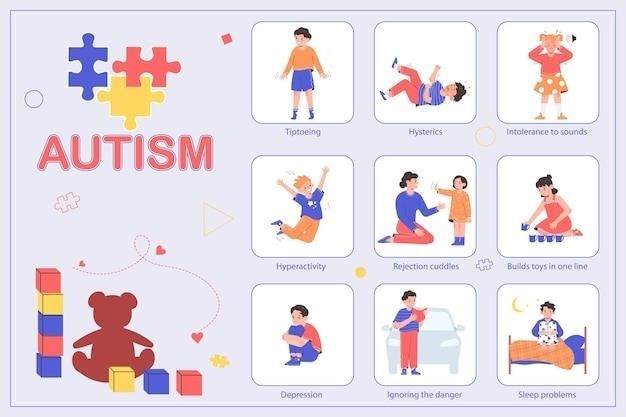Life Skills for Autism⁚ A Comprehensive Guide
This comprehensive guide explores the crucial role of life skills in empowering individuals with Autism Spectrum Disorder (ASD) to lead fulfilling and independent lives․ It delves into the diverse range of skills necessary for navigating everyday challenges, fostering social inclusion, and achieving personal goals․
Introduction
Navigating the complexities of everyday life can be a significant challenge for individuals with Autism Spectrum Disorder (ASD)․ While ASD is a unique neurological and developmental condition that impacts social interaction, communication, and behavior, it’s crucial to recognize that every individual on the spectrum is distinct․ The concept of “life skills” encompasses a diverse array of abilities that empower individuals with ASD to achieve greater independence, self-confidence, and social integration․ These skills serve as building blocks for navigating various aspects of life, including personal care, social situations, communication, and problem-solving․
This comprehensive guide aims to shed light on the importance of life skills for individuals with ASD, exploring the specific skills that are crucial for success and providing practical strategies for teaching and developing these skills․ By understanding the unique needs and strengths of individuals with ASD, we can create a supportive environment that fosters their growth and empowers them to reach their full potential․ This guide serves as a valuable resource for educators, parents, therapists, and anyone involved in the lives of individuals with ASD․
Understanding Autism Spectrum Disorder (ASD)
Autism Spectrum Disorder (ASD) is a complex neurodevelopmental condition that affects how individuals perceive, interact with, and communicate within their environment․ It is characterized by a wide range of social communication challenges, including difficulty with social interaction, understanding nonverbal cues, and engaging in reciprocal conversations․ Individuals with ASD often exhibit repetitive behaviors, interests, and routines, which can sometimes be rigid and inflexible․ The spectrum nature of ASD implies that individuals experience varying degrees of these challenges, making it essential to approach each person’s needs with individualized care and support․
While ASD is a lifelong condition, early intervention and appropriate support can significantly enhance the quality of life for individuals with ASD․ Understanding the unique characteristics and strengths of each individual with ASD is paramount in developing tailored approaches for promoting their growth, independence, and inclusion within society․ This understanding forms the foundation for effective life skills development and empowers individuals with ASD to lead fulfilling lives․
The Importance of Life Skills for Individuals with ASD
Life skills are fundamental to navigating the complexities of daily living, fostering independence, and promoting social inclusion․ For individuals with ASD, developing these skills is particularly crucial due to the unique challenges they often face․ Life skills empower individuals with ASD to participate actively in their communities, build meaningful relationships, and pursue their aspirations․ They provide the necessary tools for self-sufficiency, allowing individuals with ASD to manage their personal care, finances, and daily routines effectively․
Moreover, life skills enhance self-confidence and self-esteem, enabling individuals with ASD to advocate for their needs, navigate social situations with greater ease, and build resilience in the face of challenges․ By equipping individuals with ASD with the skills they need to thrive, we create a more inclusive and supportive environment where they can reach their full potential and live meaningful lives․
Key Life Skills for Individuals with ASD
Mastering key life skills is essential for individuals with ASD to thrive in various aspects of life․ These skills encompass a wide range of abilities, including social interaction, communication, daily living tasks, and cognitive processes․
Social skills are crucial for building meaningful connections and navigating social situations effectively․ They include understanding social cues, expressing emotions appropriately, engaging in conversations, and maintaining healthy relationships․ Communication skills are equally vital, enabling individuals to express their thoughts and needs clearly, understand others’ perspectives, and engage in effective communication; Daily living skills, such as personal hygiene, dressing, meal preparation, and managing finances, are essential for independent living and self-sufficiency․
Cognitive skills, including problem-solving, decision-making, and organizational skills, are crucial for managing daily routines and making informed choices․ Emotional regulation skills, such as recognizing and managing emotions, coping with stress, and maintaining emotional well-being, are essential for overall mental health and well-being․

Social Skills
Social skills are the foundation of meaningful relationships and successful interactions․ For individuals with ASD, mastering these skills can be particularly challenging due to differences in social communication and interaction․ Teaching social skills requires a tailored approach that considers the unique needs and strengths of each individual․
Essential social skills include understanding social cues, such as body language and facial expressions, interpreting social situations, engaging in conversations, expressing emotions appropriately, and maintaining appropriate personal space․ Building social skills can involve role-playing scenarios, practicing social scripts, and providing opportunities for social interaction in structured settings․
Social skills training programs often incorporate visual aids, social stories, and technology-based interventions to enhance learning and practice․ By developing these skills, individuals with ASD can build stronger connections, feel more comfortable in social situations, and participate more fully in their communities․
Communication Skills
Effective communication is essential for individuals with ASD to express their thoughts and feelings, build relationships, and navigate daily life․ Challenges in communication can range from difficulty with verbal language to understanding nonverbal cues․
Teaching communication skills involves a multi-faceted approach that addresses both verbal and nonverbal aspects․ This may include improving vocabulary, grammar, and sentence structure․ It also involves developing skills in using appropriate tone of voice, facial expressions, and body language to convey meaning․
Augmentative and alternative communication (AAC) methods, such as picture exchange systems (PECS) or communication boards, can provide individuals with ASD with alternative means of expressing themselves․ Technology can also play a significant role, offering tools for speech generation, text-to-speech conversion, and visual supports to enhance communication abilities․
Daily Living Skills
Daily living skills encompass the essential abilities needed to manage personal care, household tasks, and everyday routines․ These skills are fundamental for individuals with ASD to live independently and participate fully in their communities․ Examples of daily living skills include⁚
- Personal hygiene⁚ Bathing, showering, brushing teeth, and maintaining personal grooming․
- Dressing⁚ Selecting appropriate clothing for different occasions and weather conditions․
- Meal preparation⁚ Cooking simple meals, following recipes, and maintaining kitchen safety․
- Household chores⁚ Cleaning, laundry, organizing, and maintaining a tidy living space․
- Time management⁚ Managing schedules, appointments, and daily routines․
- Money management⁚ Budgeting, shopping, and handling finances responsibly․
Teaching these skills requires a structured approach that breaks down complex tasks into smaller, manageable steps․ Visual aids, checklists, and consistent routines can help individuals with ASD understand and follow instructions․
Cognitive Skills
Cognitive skills are essential for problem-solving, decision-making, and adapting to new situations․ Individuals with ASD may face challenges in these areas, but developing these skills can greatly enhance their independence and overall well-being․ Key cognitive skills include⁚
- Attention and focus⁚ Maintaining concentration on tasks, filtering distractions, and staying organized․
- Memory⁚ Remembering information, recalling past experiences, and applying knowledge to new situations․
- Planning and sequencing⁚ Breaking down tasks into manageable steps, organizing thoughts and actions, and following instructions․
- Problem-solving⁚ Identifying and analyzing problems, generating solutions, and evaluating outcomes․
- Executive functioning⁚ Managing time, prioritizing tasks, and controlling impulses․
Strategies for teaching cognitive skills include visual aids, games, and activities that promote critical thinking․ Using technology, such as apps and online programs, can also be helpful in engaging individuals with ASD and providing them with opportunities to practice these skills․
Emotional Regulation Skills
Emotional regulation skills are fundamental for managing stress, coping with difficult emotions, and maintaining healthy relationships․ Individuals with ASD may experience heightened sensitivity to sensory input, leading to intense emotions and difficulty regulating their responses․ Developing these skills is essential for promoting social competence and overall well-being․
- Identifying and labeling emotions⁚ Recognizing and understanding different feelings, such as happiness, sadness, anger, and fear․
- Expressing emotions appropriately⁚ Communicating feelings in a healthy and constructive manner, avoiding outbursts or aggression․
- Coping mechanisms⁚ Developing strategies for managing stress and anxiety, such as deep breathing exercises, relaxation techniques, or engaging in calming activities․
- Self-soothing⁚ Learning to calm oneself down when feeling overwhelmed or anxious, utilizing sensory input or other calming strategies․
- Impulse control⁚ Resisting impulsive actions and making thoughtful decisions, particularly in challenging situations․
Teaching emotional regulation skills involves providing individuals with ASD with tools and strategies for understanding their emotions and managing them effectively․ This may include social stories, role-playing, and visual aids to help them learn and practice these skills․
Teaching Life Skills to Individuals with ASD
Teaching life skills to individuals with ASD requires a personalized approach that considers their unique strengths, challenges, and learning styles․ Effective instruction involves creating a supportive and structured environment where individuals can learn and practice skills in a meaningful way․ It’s crucial to break down complex tasks into smaller steps, provide clear and consistent instructions, and offer positive reinforcement for progress․
Teaching methods should be tailored to the individual’s needs and learning style․ Visual aids, such as picture cards or videos, can be particularly helpful for individuals who learn best visually․ Using technology, such as apps or interactive games, can also enhance engagement and provide opportunities for repetition and practice․
The goal is to empower individuals with ASD to become more independent and self-sufficient․ By building their life skills, they can navigate daily routines, participate in social activities, and pursue their interests and goals․
Effective Strategies and Techniques
A range of strategies and techniques can be employed to effectively teach life skills to individuals with ASD․ These include⁚
- Task Analysis⁚ Breaking down complex tasks into smaller, manageable steps, providing clear instructions and visual cues to facilitate learning․
- Visual Supports⁚ Utilizing visual aids, such as picture cards, schedules, or social stories, to enhance comprehension and provide clear expectations․
- Positive Reinforcement⁚ Employing rewards, praise, and encouragement to motivate individuals and reinforce desired behaviors․
- Social Skills Training⁚ Teaching social interaction skills through role-playing, group activities, and real-life simulations․
- Sensory Integration⁚ Addressing sensory sensitivities and providing sensory input to promote regulation and focus․
- Functional Behavior Assessment (FBA)⁚ Identifying the triggers and functions of challenging behaviors to develop effective interventions․
These strategies should be implemented in a consistent and individualized manner to optimize learning and promote skill generalization․
Utilizing Technology for Life Skills Training
Technology has emerged as a powerful tool in enhancing life skills training for individuals with ASD․ Interactive apps, online games, and virtual reality simulations offer engaging and personalized learning experiences․ These digital resources can⁚
- Provide individualized instruction⁚ Adaptive learning platforms adjust the pace and complexity of instruction based on individual needs and progress․
- Offer repeated practice⁚ Technology allows for repeated practice of skills in a safe and controlled environment, fostering mastery and confidence․
- Promote engagement⁚ Interactive games and simulations can make learning more enjoyable and motivating for individuals with ASD, who may find traditional methods less engaging․
- Facilitate social interaction⁚ Virtual environments can provide opportunities for practicing social skills in a less-threatening context, promoting comfort and confidence in social situations․
Technology can be a valuable supplement to traditional teaching methods, offering a dynamic and engaging approach to life skills development․
Curriculum and Programs for Life Skills Development
Numerous curriculum and programs have been developed specifically to address the unique needs of individuals with ASD in developing essential life skills․ These programs often incorporate evidence-based practices and cater to different developmental levels and learning styles․ Key elements of these programs include⁚
- Structured and systematic instruction⁚ Breaking down complex skills into smaller, manageable steps, providing clear instructions and visual aids, and using repetition to reinforce learning․
- Real-world application⁚ Integrating skills training into everyday activities and situations, promoting generalization and transfer of learning to real-life contexts․
- Social skills training⁚ Focusing on developing social communication skills, understanding social cues, and engaging in appropriate social interactions․
- Functional skills training⁚ Addressing practical skills like self-care, personal hygiene, household chores, and money management․
- Cognitive skills training⁚ Improving attention, memory, planning, and problem-solving abilities to enhance independent functioning․
These programs provide a structured framework for developing essential life skills, empowering individuals with ASD to navigate their lives with confidence and independence․
Resources and Support
Navigating the journey of life skills development for individuals with ASD is often made easier with access to valuable resources and support networks․ Numerous organizations, websites, books, and assessment tools are available to provide guidance, information, and practical assistance․
These resources offer a wealth of knowledge on autism, life skills development, and effective strategies for supporting individuals with ASD․ They can help families, educators, and professionals understand the challenges, identify individual needs, and access appropriate resources․
By leveraging these resources, individuals with ASD and their families can build a strong foundation for personal growth, independence, and a fulfilling life․
Organizations and Websites
A plethora of organizations and websites are dedicated to supporting individuals with ASD and their families․ These resources provide a wealth of information, connect individuals with local support groups, and offer valuable resources for life skills development․
Organizations like Autism Speaks, the National Autism Association, and the Autism Society of America offer comprehensive information on autism, including resources for life skills training, advocacy, and support services․ Websites like Autism Research Institute, Autism Speaks, and the Autism Society of America provide detailed information on autism, life skills development, and effective strategies for supporting individuals with ASD․
These organizations and websites act as valuable hubs for information, connecting individuals with resources, and fostering a sense of community․
Books and Articles
A wealth of books and articles offer valuable insights into teaching and developing life skills for individuals with ASD․ These resources provide practical strategies, evidence-based techniques, and real-world examples to guide parents, educators, and therapists in supporting individuals on the spectrum․
Books like “Life Journey Through Autism⁚ An Educators Guide to Autism” and “A Parents Guide to Autism” provide comprehensive guides for understanding autism, navigating the challenges of raising a child with ASD, and developing essential life skills․ Articles published in journals like “Cambridge Prisms” and “Autism Research Institute” delve into specific areas of life skills development, exploring effective interventions and sharing research findings on various aspects of ASD․
These resources offer a valuable foundation for understanding autism and developing effective strategies for enhancing the lives of individuals with ASD․
Assessment Tools and Checklists
Assessment tools and checklists serve as invaluable resources for identifying specific areas of strength and need in life skills development for individuals with ASD․ These instruments help professionals and families gain a comprehensive understanding of an individual’s abilities, challenges, and progress in key areas such as communication, social interaction, daily living, and cognitive skills․
Examples of assessment tools include the “Autism Index” and the “A-GARS-3,” which provide standardized assessments for identifying autism spectrum disorder and evaluating specific skills․ Checklists, such as the “Functional Life Skills Checklist” and the “Independent Living Skills Checklist,” offer detailed guidance for assessing an individual’s proficiency in various life domains․ These tools facilitate personalized intervention plans, ensuring that support is tailored to the individual’s unique needs and goals;
By utilizing these assessment tools and checklists, professionals and families can effectively monitor progress, identify areas for improvement, and celebrate milestones in the journey of life skills development․









